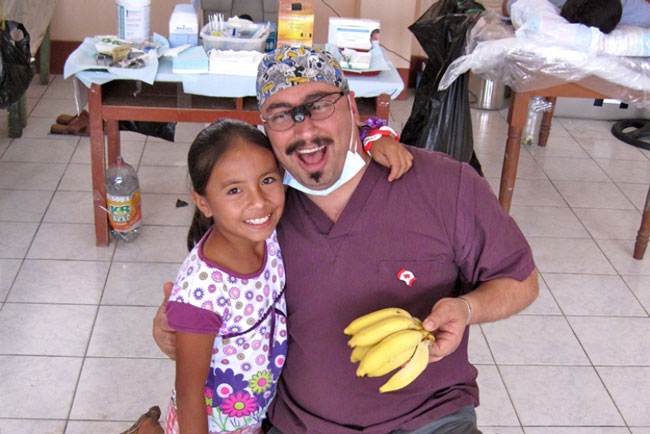
McGill Dentistry team offering free dental treatments to impoverished Nicaraguans
By Neale McDevitt
Many of us anticipate a visit to the dentist with a feeling of foreboding, if not outright dread. When was the last time you fist-bumped your dentist when she said you needed a root canal?
But over the course of the next two weeks, a team of McGill Dentistry professors and students will be greeted with hugs, handshakes, tears of joy – and, of course, smiles, countless smiles – as it travels to Nicaragua to provide free dental care to hundreds of impoverished people.
“We serve the poorest of the poor, people who just can’t afford to see a dentist,” says Dr. Gerard Melki, of the Faculty of Dentistry. “I treated a man [on a previous dental expedition] who told me that to pay for a simple tooth extraction, he’d have to work 3-4 days in the field.”
“Mostly what we’re doing is relieving people’s pain,” says Dr. Melki. “Many of these people have never seen a dentist in their whole life. You know how bad it can be living with a toothache for a couple of days – imagine weeks and months of constant pain.”
Dr. Melki, has been volunteering his time and expertise throughout Central and South America since 1994, helping restore smiles from Honduras, Guatemala and Peru, to Ecuador, Mexico and Belize. Over the years, he began enlisting McGill students and fellow faculty members, who have taken time from their busy winter semesters to embark upon an expedition. The project, called Dental Bears Necessity, has become so popular that students must apply before undergoing a selection process.
This year, for the first time, the expedition to Nicaragua is part of a course offered by the Faculty. In all, seven Dentistry students and seven faculty members will make the trip, working in conjunction with humanitarian organizations Change for Children and Kindness in Action.
No frills ‘jungle dentistry’
Dr. Melki says the team will be performing mostly emergency procedures – extractions, fillings and root canals. The pace will be fast and the conditions far from perfect. “This is jungle dentistry,” he says with a laugh. “We try to see about 100 patients a day, so we don’t have the luxury of taking an hour per patient. We’re on our feet from 8:30 in the morning until 6 p.m. in 40-degree weather with no air conditioning and, sometimes, no running water.”

As well, the McGill team will be handing out free toothbrushes and invaluable lessons on the importance of proper dental hygiene in avoiding dental problems down the road.
For the first few days, McGill faculty members (all of whom are practicing clinicians) will provide the primary care at the clinics, while the students assist and, most importantly, learn by watching.
Then the roles are reversed, with the students taking the reins under the close supervision of faculty. “For students it is a great learning opportunity. It’s one-on-one supervision, and they see so many patients,” says Dr. Melki. “When they come back you can see how much their confidence has grown.
“On top of that – and in some ways, maybe the most important thing they come away with – is the joy you feel when you help another person. You can’t put a price tag on that.”
Have mobile x-ray machine, will travel
On top of enthusiasm and expertise, the Dental Bears Necessity team brings with it all the cutting-edge dental equipment it can carry – literally. Like an army MASH unit, the team will bring its own equipment, set it up and break it down again when the job is done. “For two weeks everyone lives out of their single piece of carry-on luggage,” says Dr. Melki. “They need their hands free to carry all our gear.”
While many Canadians may not think of the profound transformative powers of a mobile dental clinic, Dr. Melki’s experience suggests otherwise.
“I treated a young man in Panama who was feverish and in real agony because he was suffering from a large abscess,” says Dr. Melki. “We fixed him up and got him on some antibiotics – relatively routine treatment here, but almost life-changing there.”
Often, after treatment, people come back to the clinic bearing food from their gardens or homemade meals. “These people don’t have much, but they give whatever they have,” says Melki. “You can see it in their eyes, they really appreciate our help.”
Editor’s Note: Dental Bears Necessity is entirely self-funded. Each person going on this year’s expedition to Nicaragua will be paying some $3,000 out of pocket to pay, with much of the money going toward equipment like needles and anesthetics. A Seeds of Change fundraising website has been established to raise money for next year’s expedition. If you would like to learn more and donate to this important outreach program, visit the website.
